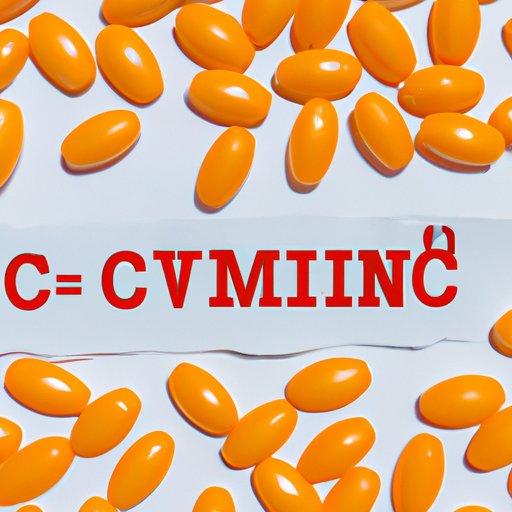
Introduction
Vitamin C, also known as ascorbic acid, is an essential nutrient required for a broad range of bodily functions. It plays a crucial role in maintaining skin health, strengthening the immune system, and enhancing the absorption of iron from plant-based foods. While it’s essential to get an adequate amount of Vitamin C daily, the risks of too much Vitamin C are often overlooked. In this article, we will explore the dangers of excessive intake of Vitamin C, the recommended dosages, and ways to get the right amount of Vitamin C in our diet.
The Recommended Daily Intake of Vitamin C: How Much Is Too Much?
According to the National Institutes of Health (NIH), the recommended daily intake of Vitamin C for a healthy adult is around 75 to 90 milligrams per day. However, certain age groups, such as pregnant and breastfeeding women or smokers, may require a slightly higher intake of Vitamin C. For children, the formula for calculating the recommended daily intake is 15 milligrams per day for every pound of body weight.
Exceeding the recommended daily intake of Vitamin C can cause adverse effects. The tolerable upper intake level (UL) of Vitamin C recommended by NIH is 2,000 milligrams per day for adults. This means that exceeding this limit regularly can lead to harmful effects on the body.
To calculate the daily recommended intake of Vitamin C for your body, you can use an online Vitamin C calculator or consult a healthcare professional.
Can Too Much Vitamin C Be Harmful? Know the Risks and Symptoms
While Vitamin C is essential for the body, excessive consumption of it can lead to side effects. Some potential side effects of overconsumption of Vitamin C include:
- Diarrhea
- Nausea and vomiting
- Heartburn and abdominal cramps
- Headache and fatigue
- Kidney stones in long-term high intake
In severe cases, long-term overconsumption of Vitamin C can lead to Vitamin C toxicity, a condition also known as hypervitaminosis C. This condition can cause severe damage to the body by interfering with the absorption of other nutrients and minerals, leading to harmful consequences.
The symptoms of Vitamin C toxicity include:
- Stomach cramps and abdominal pain
- Diarrhea and vomiting
- Fatigue and drowsiness
- Headache and joint pain
- Liver and kidney damage
The best way to prevent excessive intake of Vitamin C is by following a healthy and balanced diet that includes sufficient intake of fruits and vegetables.
Overdosing on Vitamin C: Understanding the Consequences
Consuming a very high amount of Vitamin C supplements can lead to overdose and severe consequences. While it’s rare to overdose on Vitamin C through a natural diet, overdosing on supplements is becoming increasingly common. Some serious consequences of overdosing on Vitamin C include:
- Severe stomach and gastrointestinal problems
- Nausea, vomiting, and dizziness
- Headaches and migraines
- Vision loss and nerve damage
- Heart and kidney failure
It’s important to note that self-medicating with Vitamin C supplements can cause more harm than good. Always consult your healthcare professional before taking any Vitamin C supplements to ensure your safety.
When Supplements Become a Threat – Dangers of Exceeding the Daily Limit of Vitamin C
Taking too many Vitamin C supplements can cause more harm than good. While supplements can sometimes be beneficial in meeting the daily recommended intake of Vitamin C, they are not a substitute for a healthy diet. Some potential effects of taking too many supplements include:
- Possible interaction with other medications in your body
- Inability to absorb other necessary nutrients
- Overdosing on Vitamin C
If you need to take Vitamin C supplements, make sure to choose supplements from a reputable brand and talk to your healthcare professional
Balancing the Benefits and Risks of a High Vitamin C Diet
Vitamin C has a wide range of benefits, including improving skin quality, preventing heart disease and stroke, reducing the risk of cataracts, and enhancing immune function. A balanced diet with an adequate amount of Vitamin C can help you get these benefits without any adverse effects.
Some foods that are rich in Vitamin C include:
- Citrus fruits and juices
- Berries
- Broccoli and spinach
- Tomatoes and peppers
- Kiwi and mangoes
To balance your diet with Vitamin C, you can include these foods in your daily meals and snacks. When cooking, try to minimize the cooking time, as long-term heat processing can lead to a significant loss of Vitamin C.
Moderation Is Key: Avoiding the Adverse Effects of Excessive Vitamin C Consumption
The primary principle to follow in consuming Vitamin C is moderation. Excessive intake can lead to adverse effects, while insufficient intake can result in health problems. Here are some steps you can take to maintain a healthy and balanced diet that includes Vitamin C:
- Include a wide range of Vitamin C-rich foods in your diet
- Avoid self-medicating with Vitamin C supplements
- Always consult healthcare professionals before taking any supplements
- Avoid prolonged storage of Vitamin C-rich foods
- Don’t rely on Vitamin C supplements instead of a healthy diet.
Conclusion
Vitamin C plays a crucial role in our daily diet, but excessive consumption can lead to adverse effects on our body. In this article, we have explored the recommended daily intake of Vitamin C, the risks of overconsumption, and possible ways to prevent it. With moderation and a healthy balanced diet rich in Vitamin C, we can reap the benefits of this essential nutrient without any adverse effects.





